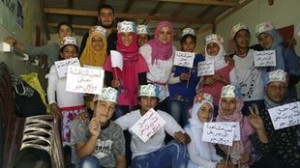The EIB helps countries manage the refugee crisis
The flight of refugees from war-torn Syria is generating major human and economic repercussions in neighbouring countries, but also in Europe. The European Investment Bank (EIB) is providing support to the countries concerned. Its President, Werner Hoyer, advocates an ambitious response to match the scale of the issues faced.
 One million migrants arrived in Europe in 2015. Most of them risked their lives to cross the Mediterranean. There are now as many displaced persons as at the end of the Second World War. The idea that closing borders will resolve this lasting crisis is illusory. Countries need to face up to their responsibilities now.
One million migrants arrived in Europe in 2015. Most of them risked their lives to cross the Mediterranean. There are now as many displaced persons as at the end of the Second World War. The idea that closing borders will resolve this lasting crisis is illusory. Countries need to face up to their responsibilities now.
Since September, the EIB President has taken a clear position with the Member States, making it clear that his institution was ready to provide strong support to the efforts of the international community. Over and above supporting Member States, the EIB is also prepared to help transit countries, such as Lebanon, Jordan or Turkey, as Werner Hoyer stated on 4 February 2016, at the Supporting Syria & The Region conference in London on 4 February 2016.
“Our response must be ambitious. It must also be concerted among all partners. The EIB is ready and perfectly placed, thanks to our three decades of experience in the Mediterranean, to support the efforts of Europe and the international community as a whole in tackling this grave and urgent crisis. This is why today, as the largest financial institution active in this region, we have announced our readiness to work closely with our partners to further increase our already substantial activities. In light of the urgent need and its importance for the European Union, the EIB – as the EU bank – can step up its efforts over the next five years in Turkey and the Middle East and North African countries provided the necessary conditions are in place.”
Additional resources to do more
Over the next five years, the EIB plans to lend over €15 billion in Mediterranean partner states and in Turkey. An additional €3 billion could be made available, in partnership with other international financial institutions, by combining the EIB’s know-how and its ability to mobilise financial resources and combine them with non-refundable aid from Member States or the European Union. The EIB could do even more, depending on the availability of additional resources and whether it is given extended m andates. President Werner Hoyer continued – “I would like to make an even more ambitious proposal to our shareholders, the EU member states, to step up activities in Turkey and the MENA region further by a further €5 billion between now and 2020. That would mean a total additional amount over five years of up to €8 billion.”
The core economic challenges for the region will be to enhance economic resilience and boost employment opportunities in the respective countries. The efforts of the EIB will therefore focus first and foremost on support for the private sector in these countries (SMEs, corporations, microfinance) as well as support for education and improvements to basic services and essential infrastructure.
Focus
The European Investment Bank (EIB) is the lending institution of the European Union, owned by its Member States. It makes long-term finance available for sound investment in order to contribute towards EU policy goals.
In the wider region affected by the Syrian conflict, in 2015 the EIB signed off on loans of €4 billion in non-EU countries (Turkey, Jordan, Egypt, Israel, Morocco, Tunisia, Serbia, Montenegro, Kosovo). This corresponds to approximately half of EIB lending outside of the EU.
Box:
Projects around the borders of Syria
The EIB’s involvement in the Middle East aims to restore stability and encourage refugees to stay in their region. It also supports very specific projects:
- It is currently assessing a loan application for the construction of a new 1,875-bed hospital in Gaziantep near the Turkey-Syria border. The hospital will be open to the local population, but will also offer health services to Syrian refugees, whose presence is putting pressure on the region's healthcare system.
- It is supporting ITWorx, the online learning platform from Winjigo, which could be extended to all Syrian children refugees in Lebanon within three months.
- It has shareholdings in two other EuroMena investment funds focused on the Mediterranean basin. Its increasing commitment within the region is reflected in the increase of its equity investments, which have risen from €13 million in 2008 to €20 million in 2013.



